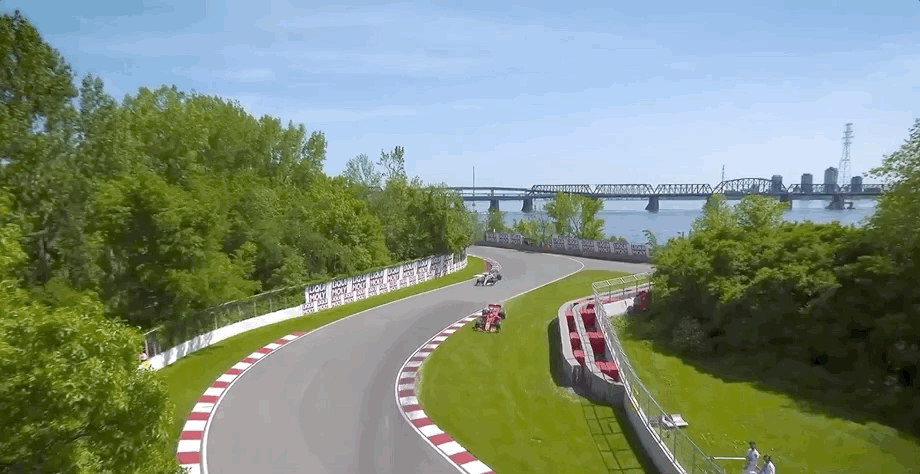Final Wheel Movement Decided Controversial Penalty That Undid Ferrari's F1 Win: Report
The Canadian Grand Prix on Sunday began as a welcome break from the norm in Formula One, with a car finally giving Mercedes, which has won every race this year, a real challenge—a beatdown, even. But the race ended with Mercedes on top yet again, by virtue of a penalty dealt to the team that actually finished first.
It was an interesting day, to say the least, but a new report on Motorsport.com might help clear up a little bit about what happened.
In terms of what we already knew, Sebastian Vettel and Ferrari, the team that's been behind all year in F1, finally had a good race in Canada over the weekend—besting Mercedes driver and championship leader Lewis Hamilton all day. It all abruptly ended when Vettel appeared to lose control of his car and take a shortcut through the grass, coming back onto the track as Hamilton closed in on his lead.
"He just came on the track so dangerously," Hamilton radioed to his team after the maneuver, as broadcasted by Sky Sports.
"Yeah, copy, Lewis, we're on it," the team radioed back. Hamilton said after the race that a penalty was "absolutely not the way" he wanted to win, but that's exactly what became of the situation.
The move, which happened just under 50 laps in and took nearly 10 laps for the stewards to issue a decision, resulted in a five-second penalty for unsafe reentry to be added to Vettel's time at the checkered flag (or computer display). Vettel was about 2.6 seconds ahead of Hamilton when he got word of the penalty, but wasn't able to stretch his lead enough to negate the penalty. Hamilton won and Vettel got second, despite the two crossing the line the opposite way.
The ruling was so controversial that even the Sky Sports broadcasters couldn't understand the stewards' ruling, and that Vettel switched the first- and second-place signs in front of his and Hamilton's cars in the parc fermé after the race. Ferrari said after the race that it plans to appeal the penalty.
But according to Motorsport.com, which didn't attribute the information to any specific sources and simply said it "has learned" what solidified the stewards' decision on Sunday, the big factor was a final wheel input from Vettel after he appeared to regain control of his car. Here's what Motorsport.com learned:
The footage clearly captures Vettel correcting an oversteer moment as he rejoins the track – which is shown by a sharp steering wheel movement to the right by the German.
Shortly after that, however, Vettel has dispatched the oversteer and begins steering to the left to follow the direction of the circuit – suggesting he is now under control.
But a split moment later, rather than keeping to the left, Vettel is shown to release the steering wheel which allows his car to drift to the right – cutting off the route that Hamilton would have taken had he had clear space.
Motorsport.com, which has more on what apparently went into the decision, also reported that the stewards used an extra CCTV camera view that wasn't shown on TV to see "Vettel's head looking in the mirrors at where Hamilton was." Vettel told his team there was basically nothing he could do.
"I had nowhere to go," Vettel said, as broadcasted by Sky Sports. "Seriously, I had nowhere to go." It isn't clear after this statement whether Vettel said he "did" or "didn't" see Hamilton behind him, because race-car audio isn't the best quality. But Vettel later said the stewards were "stealing the race" from Ferrari, and asked, "Where the hell am I supposed to go? If [Hamilton] had gone to the inside, he could've passed me."
The whole incident is one that could be seen and substantiated from a number of perspectives, meaning the decision wasn't at all clear cut—something a race-deciding penalty should be.
Vettel could've drifted toward Hamilton to choke his chance of passing during a mistake, sure, but he also could've still been getting his car under control. Not even the best of drivers can avoid a mistake sometimes, and over-officiating a simple racing move—even if intentional—means neither the competitors nor the viewers win in the end.
But, of course, sports aren't sports without a huge segment of the viewership disagreeing with the officials. F1 is just here to remind everyone of that.
This story has been clarified to say it's unclear whether Vettel said he "did" or "didn't" see Hamilton on his team radio due to the audio quality, when it previously quoted him as saying he didn't.
